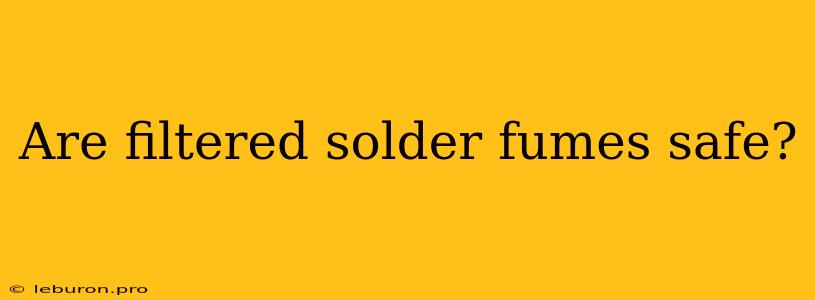Soldering is a fundamental process in electronics manufacturing and repair, involving the melting of solder to join metal components. While soldering offers numerous benefits, it also presents potential hazards, primarily due to the fumes generated during the process. Filtered solder fumes are often employed to mitigate these hazards, but the question of their safety remains a crucial consideration. This article delves into the nature of solder fumes, the potential health risks associated with exposure, and the effectiveness of filtration systems in safeguarding workers' well-being.
The Nature of Solder Fumes
Solder fumes are a complex mixture of metallic oxides, organic compounds, and particulate matter released during the soldering process. The specific composition of these fumes varies depending on the type of solder, flux, and soldering temperature. Common components of solder fumes include:
- Lead (Pb): Lead is a heavy metal that can accumulate in the body and cause various health issues, including neurological damage, reproductive problems, and cardiovascular disease.
- Tin (Sn): Tin is generally considered less toxic than lead but can still pose risks in high concentrations.
- Cadmium (Cd): Cadmium is a highly toxic metal that can damage the kidneys, lungs, and bones.
- Antimony (Sb): Antimony is another toxic metal that can affect the heart, liver, and nervous system.
- Flux Residues: Fluxes are used to clean metal surfaces and aid in solder flow, but they often contain organic compounds that can irritate the respiratory system.
- Particulate Matter: Solder fumes also contain fine particulate matter, which can be inhaled deep into the lungs and contribute to respiratory problems.
Health Risks Associated with Solder Fumes
Exposure to unfiltered solder fumes can pose significant health risks, particularly for workers involved in soldering operations. These risks include:
- Respiratory Problems: Inhaling solder fumes can irritate the lungs and airways, leading to coughing, wheezing, shortness of breath, and chronic obstructive pulmonary disease (COPD).
- Metal Poisoning: Lead, cadmium, and antimony can accumulate in the body and cause various health problems, including neurological damage, kidney dysfunction, and bone abnormalities.
- Skin and Eye Irritation: Solder fumes can also irritate the skin and eyes, causing redness, itching, and burning.
- Reproductive Effects: Some metals found in solder fumes, such as lead and cadmium, can negatively impact fertility and increase the risk of birth defects.
- Cancer: Studies have linked long-term exposure to solder fumes to an increased risk of certain types of cancer, including lung cancer.
The Importance of Filtered Solder Fumes
To mitigate the health risks associated with soldering fumes, it is crucial to implement effective fume extraction and filtration systems. Filtered solder fumes are a critical component of workplace safety protocols, helping to remove hazardous particles and gases from the air.
Types of Solder Fume Filtration Systems
There are various types of filtered solder fumes systems available, each with its own advantages and disadvantages. Some common types include:
- Local Exhaust Ventilation (LEV): This type of system uses a fume hood or extractor to capture fumes at the source and direct them to a filter. LEV systems are effective for localized applications, such as individual workstations.
- Centralized Extraction Systems: These systems collect fumes from multiple workstations and direct them to a central filter unit. Centralized systems are ideal for large-scale soldering operations.
- Activated Carbon Filters: These filters use activated carbon material to adsorb organic compounds and other gases from the air.
- HEPA Filters: High-efficiency particulate air (HEPA) filters are designed to remove fine particulate matter, including those containing metals.
- Combined Filtration Systems: Some systems combine multiple types of filters to provide comprehensive protection against a wide range of pollutants.
Choosing the Right Filtration System
The choice of filtered solder fumes system depends on several factors, including the type of soldering process, the volume of fumes generated, and the specific contaminants present. It is important to consult with a safety professional to determine the most suitable filtration system for your workplace.
Effectiveness of Solder Fume Filtration
The effectiveness of filtered solder fumes systems in removing harmful contaminants from the air depends on several factors, including:
- Filter Efficiency: The type of filter used and its ability to remove specific pollutants.
- Airflow Rate: The volume of air passing through the filter per unit time.
- Maintenance Practices: Regular filter replacement and cleaning are essential for maintaining optimal performance.
- Proper Installation and Operation: Proper installation and operation of the filtered solder fumes system are crucial for its effectiveness.
Importance of Regular Monitoring and Testing
Even with filtered solder fumes systems in place, it is essential to regularly monitor air quality and ensure that the system is effectively removing hazardous contaminants. This can be done through:
- Air Sampling: Collecting air samples to measure the concentrations of specific pollutants.
- Filter Inspection: Regularly inspecting and replacing filters as needed.
- System Testing: Periodically testing the filtered solder fumes system to ensure its functionality.
Conclusion
Solder fumes can pose significant health risks to workers involved in soldering operations. Filtered solder fumes systems are essential for mitigating these risks by removing hazardous particles and gases from the air. Choosing the right type of filtration system and maintaining it properly are crucial for effective fume control. Regular monitoring and testing are also necessary to ensure that the filtered solder fumes system is working effectively and protecting workers' health. By prioritizing safety and using effective filtration systems, employers can create a healthier and safer workplace for their employees.
